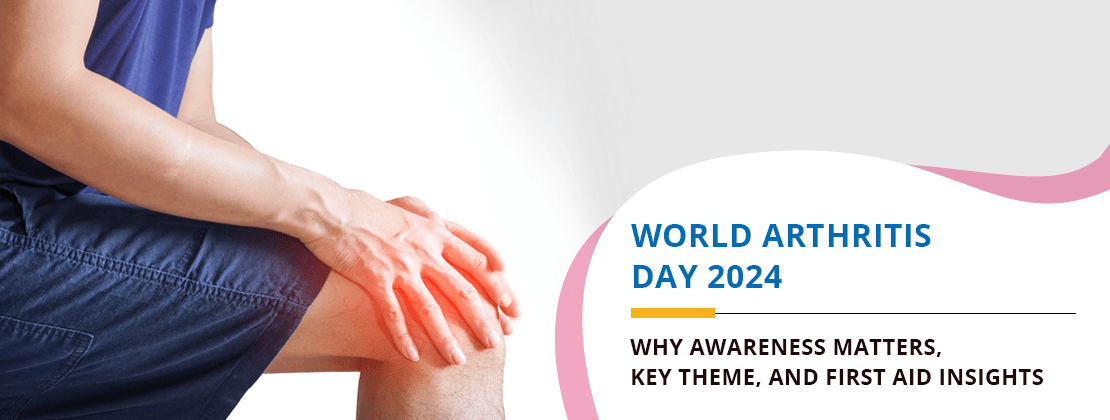
Home / Blog / World Arthritis Day 2024: Why Awareness Matters, Key Theme, and First Aid Insights
Every year on 12th October, World Arthritis Day is celebrated globally to promote knowledge about arthritis, which affects many individuals.
The theme for World Arthritis Day 2024 is “Informed Choices, Better Outcomes,” and it focuses on providing useful information that will help people discover the illness early and better the lives of arthritis patients. The increased global concern for arthritis makes World Arthritis Day 2024 timely, emphasising that awareness and education can be used to overcome the challenges of this disease.
Table of Contents
Arthritis refers to a group of diseases that cause inflammation in the joints. It manifests through immense pain, swelling, and limited movement. It comprises more than one hundred varieties, such as osteoarthritis and rheumatoid arthritis.
Osteoarthritis (OA): This is a degenerative joint disease that is often caused by wear and tear over time. It is common among the elderly population and mostly affects the knees, hips, and fingers.
Rheumatoid Arthritis (RA): RA is an autoimmune disease characterised by the body’s immune system mistakenly attacking healthy synovial tissues, resulting in swelling and injury of affected tissues. Although it may occur at any age, the most common is when it targets both sides’ joints.
There are approximately millions of people around the world who have been diagnosed with arthritis. It can lead to long-lasting illnesses such as chronic pain, immobility problems, and even disabilities.
Early diagnosis of arthritis is crucial to prevent permanent joint damage, reduce symptoms, and preserve the quality of life among patients.
World Arthritis Day 2024 is all about raising awareness of the crucial aspects of this condition and helping people put themselves ahead of this condition.
Watch this video as Dr. Priyank Gupta shares the significance of World Arthritis Day:
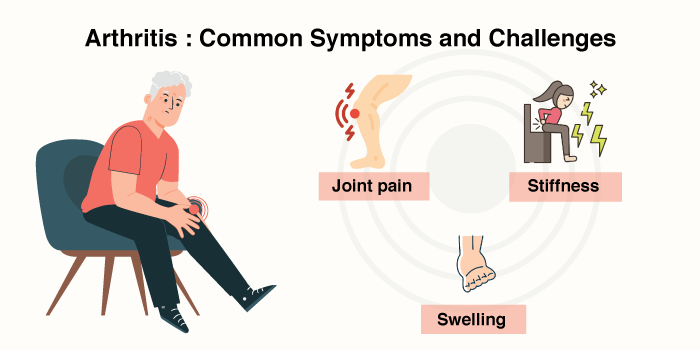
These are the usual arthritis symptoms and problems that people who have arthritis experience:
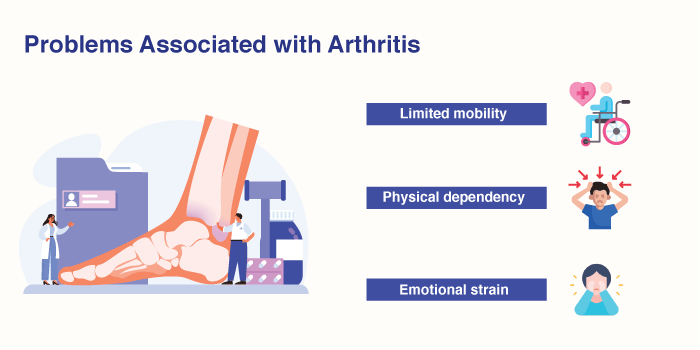
Education and Arthritis awareness are very crucial in fighting arthritis, as they give power to both individuals and communities, enabling them to be able to handle it effectively. This is why:
Creating arthritis awareness is very important so that people can be urged to take early measures to identify any arthritic signs that may lead to serious symptoms or immobility.
Many individuals ignore initial signs of arthritis like stiffness or soreness in joints, believing that they are associated with increasing age.
Creating arthritis awareness must become a priority for healthcare organisations and support groups so that people seek medical attention quickly, hence receiving treatment before it becomes too late for them.
Watch the below video to learn more about the different treatment approaches for knee pain:
Arthritis is not just a physical condition—it also affects mental and emotional well-being. These programs promote unity among those who have arthritis, connecting them with various support groups as well as available medical personnel. The availability of a strong support system can help arthritis patients cope better and focus on recovery.
The World Arthritis Day 2024 will revolve around the theme “Informed Choices, Better Outcomes.” This theme focuses on teaching people about arthritis so that they can decide well about their health and treatment. It aims at informing individuals on the importance of early diagnosis.
It stresses how knowledge can be power; it seeks to make work easier for those who have arthritis so that they can get medical help fast and choose things that will give them long-term advantages in terms of improved quality of life.
Everyone has an opportunity to take part in World Arthritis Day 2024 in various ways, such as distributing educational materials, being part of awareness programs, and encouraging people to seek medical attention when they experience the signs of arthritis. In addition, communities should plan local activities that raise awareness about arthritis.
Living with arthritis is difficult because you never know when you will have a flare-up. Flare-ups are sudden increases in pain or swelling that can be caused by certain events or changes in weather, such as stress, overexertion, and hot or cold temperatures, respectively.
Some typical signs of increased inflammation and swelling include:
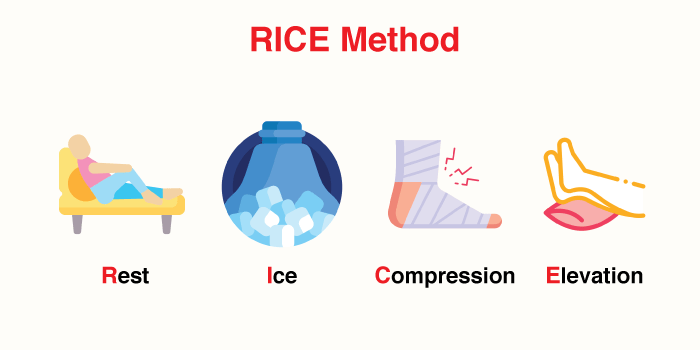
Non-steroidal anti-inflammatory drugs (NSAIDs) such as ibuprofen may offer a brief relief from arthritis-related joint pain and inflammation. However, one should always seek medical advice and undergo regular arthritis screenings at renowned facilities like HCG Hospitals before taking any medication, especially if they have other illnesses.
Although arthritis is a chronic disease, it can be controlled to a great extent, so it does not affect daily living activities. The following are some important approaches:
Physical therapy improves joint flexibility, strengthens periarticular musculature, and reduces stiffness. Mild activities such as swimming, walking, and yoga can keep the joints moving well without overusing them.
Some specific modifications in arthritis management include:
Medical attention should be sought under certain circumstances:
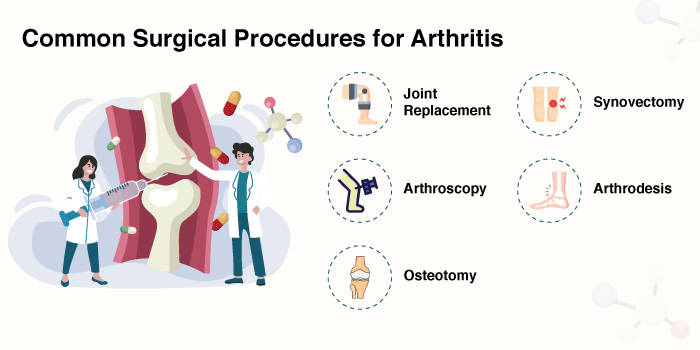
World Arthritis Day 2024 serves as a reminder for us to sensitise people about arthritis and encourage them to take charge of their joint health. Education, timely identification, and proper medication can enable arthritis patients to have satisfying lives. In line with the theme for this year, “Informed Choices, Better Outcomes,” we should unite to educate others and promote proactive approaches to arthritis management.
HCG Hospitals is a leading hospital for orthopaedic care in Ahmedabad. Along with being equipped with all major advanced diagnostic and treatment facilities for arthritis care, it also has specialised screening packages designed for arthritis in order to promote timely diagnosis and management.
World Arthritis Day is a global awareness initiative that aims to sensitise people about arthritis as well as campaign for improved medical care and assistance to the victims of this disease.
People who have arthritis can be given better care, discover it in good time, and also have an enhanced life because of increased awareness.
There are more than one hundred types of arthritis, such as gout and psoriatic arthritis. However, osteoarthritis (OA) and rheumatoid arthritis (RA) are the most well-known ones.
Use the RICE method: Rest, Ice, Compression, and Elevation, in addition to OTC pain medication.
Regular physical activity, eating healthy food, controlling body mass, and effective stress management can help control arthritis symptoms.
Physical therapy helps make the joints more flexible and less stiff; it also strengthens the muscles around the joints.
Arthritis that is left untreated can cause long-lasting pain, joint deformity, and an inability to function properly.
Getting diagnosed early prevents permanent joint damage and allows prompt treatment, leading to better results in general.
If the pain in the joints continues or becomes worse, and there is swelling as well as difficulty moving, one should consult a doctor.